WaterMateriality
Our approach
Water is a finite resource. In recent years, water-related disasters, the gap between water supply and demand, and other problems concerning water have become global issues. These are critical issues for our business operations, which involve products that use water as a principal raw material. The Yakult Group has set fixed targets to reduce water consumption (per production unit) and formulated water management plans to address water risks at production bases in order to promote the conservation and sustainable use of water resources.
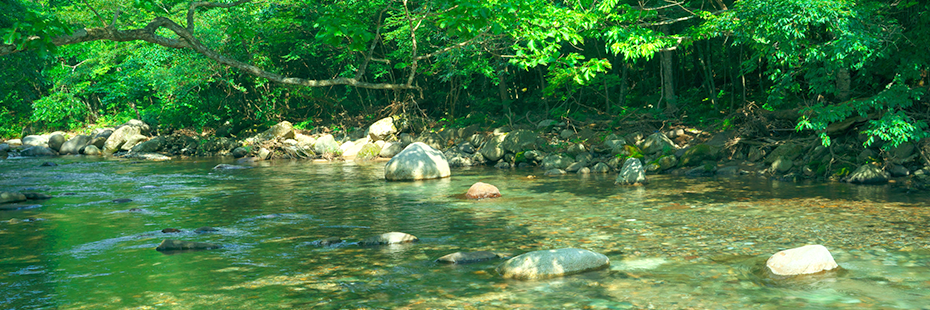
Related SDGs
Conserving water resources and responding to water risks
At Yakult Honsha plants and bottling companies, we have been cutting our water use by recycling water and improving our operations, and have been minimizing our impact on rivers through total wastewater management. We have been regularly conducting water risk surveys and, based on the findings, reviewing our production processes and taking necessary measures.
We announced Environmental Vision 2050 in April 2021. In our Environmental Actions (2021–-2024) and Environmental Targets 2030—set as short- and medium-term milestones for achieving the Environmental Vision 2050—we aim to reduce water usage (at dairy product plants in Japan, per production unit) by 3% over 2018 levels by the end of fiscal 2024, and by 10% by the end of fiscal 2030.
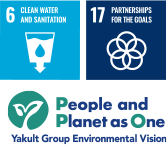
Main initiatives
Understanding water risks
To use water sustainably, we believe that we are required to recognize our water risks, including water supply and demand outlook in the river basins where our plants are located, the possibility of water-related disasters, and impacts on public health and ecosystems. Since fiscal 2017 we have thus engaged an external organization to perform water risk evaluation.
In 2020 we used the WRI Aqueduct*1 and other tools to evaluate water risks and identify which Yakult Group production bases are located in regions with high water stress levels.
Results showed that 28% of our production bases are located in areas of high water stress,*2 with water use in these areas totaling 2,047,922 m3 in fiscal 2020, or 33.2% of our total water use that year.
*1
Aqueduct: A tool for evaluating water risks developed by the World Resources Institute (WRI), a global environmental NGO
*2
Production bases that the WRI Aqueduct tool ranks as having “extremely high” and ”high” baseline water stress

Initiatives in each country and region
Reusing treated water to water green spaces: Yakult S.A. de C.V. (Mexico)
At our Ixtapaluca Plant, water treated at wastewater treatment facilities is reused to water green spaces around the plant. In 2021, a monthly average of 1,413 tons for a yearly total of 16,956 tons of water was used for watering.
Installing production wastewater purification facilities: Yakult China Group
At our Wuxi Plant, we have installed production wastewater treatment facilities that meet China’s Class 1A wastewater standards. Class 1A wastewater is considered of sufficient quality for reuse as industrial water, and the wastewater at our Wuxi Plant is used by plants belonging to other companies after passing through the final water treatment location. We have also installed domestic wastewater purification facilities at our Wuxi Plant and ensure that wastewater meets the standards for external discharge before it is discharged.
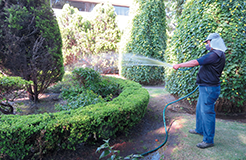
Using treated wastewater to water green spaces
(Yakult S.A. de C.V. (Mexico))
Special
Report
Report from the Frontlines
Living alongside the people of Wuxi, a metropolis on the water: Wuxi Yakult Co., Ltd.

Living alongside the people of Wuxi, a metropolis on the water: Wuxi Yakult Co., Ltd.
Wuxi Yakult Co., Ltd. is located near China’s Lake Tai, an area where strict wastewater standards have been established to protect the water sources vital to everyday life. In this article, one of our managers looks back on our successful initiatives to meet the central government’s strict water quality standards through cooperation with local administrators and other companies.
Protecting water sources for everyday life on the shores of Lake Tai, one of China’s best-known freshwater lakes
Wuxi Yakult Co., Ltd. was established in 2014 in the city of Wuxi on the shores of Lake Tai, China’s third-largest freshwater lake. Throughout its long history, Wuxi has flourished thanks to easy access to water transport via the lake and the Yangtze River. Sometimes called the “Pearl of Lake Tai,” this metropolis on the water is also known as the birthplace of Wu, one of China’s famous Three Kingdoms. Residents of southern Jiangsu and northern Zhejiang provinces source household water from Lake Tai to this day.
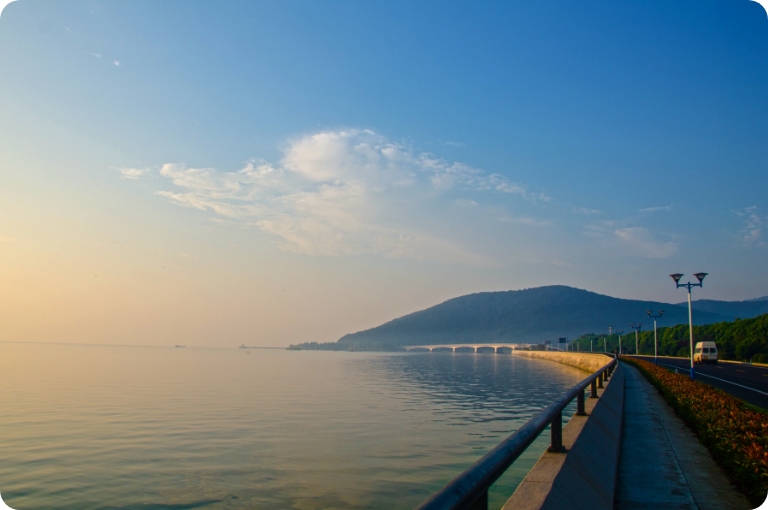
Lake Tai, China’s third-largest freshwater lake
In 2007, a widespread outbreak of cyanobacteria in Lake Tai deeply contaminated the lake’s water and threatened the water supply for approximately two million Wuxi citizens. In response, the State Council of the People’s Republic of China , equivalent to Japan’s Cabinet Office, ordered the strengthening of Lake Tai’s water quality management, which accelerated the water pollution prevention initiatives of the local Jiangsu provincial government.
The legal standards for wastewater containing nitrogen and phosphorous are particularly strict. Companies or individuals who violate these laws face large fines and even the risk of arrest. At the same time, all companies and individuals are obligated to report illegal wastewater activities, with accurate reports eligible for financial rewards from the government. Our Wuxi Plant , which manufactures dairy products, creates production wastewater containing nitrogen and phosphorous on a daily basis. For this reason, we have worked to protect the waters of Lake Tai in accordance with these legal standards since the plant’s establishment.

Lake Tai, China’s third-largest freshwater lake
No external wastewater discharge allowed
Companies in the Lake Tai basin are prohibited from discharging wastewater containing nitrogen and phosphorous from their plants by laws and regulations such as the Environmental Protection Law of the People’s Republic of China and the Law of the People’s Republic of China on Prevention and Control of Water Pollution . In addition, wastewater is required in to be reused in-house.
However, to reuse all of our production wastewater within Wuxi Yakult Co., Ltd. would have been difficult. We therefore sought to comply with all legal requirements concerning wastewater treatment, including its reuse at other companies’ plants, by conducting wastewater treatment which meets the A-level criterion under the First Class National Sewage Treatment Discharge Standards. This allows the treated wastewater to be reused for industrial purposes.
The process begins with initial treatment of production wastewater at Wuxi Plant facilities. The wastewater is then sent to a government-designated company specializing in water treatment where it is treated again before finally being used at other company plants. In 2022, 176,561 tons of our wastewater, approximately 70% of the total, were reused. Some treated wastewater is also reused internally for purposes such as cooling, landscaping, and toilet plumbing.
We also installed an online monitoring device at our plant’s drainage outlet for constant confirmation that the First Class A-level criterion is being met. These results can also be viewed on the government’s wastewater management department website.
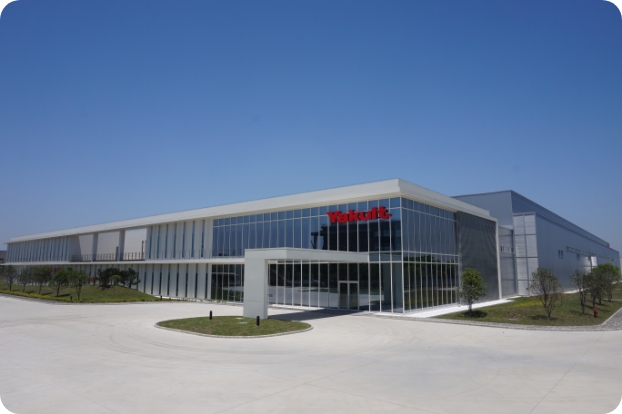
Wuxi Plant
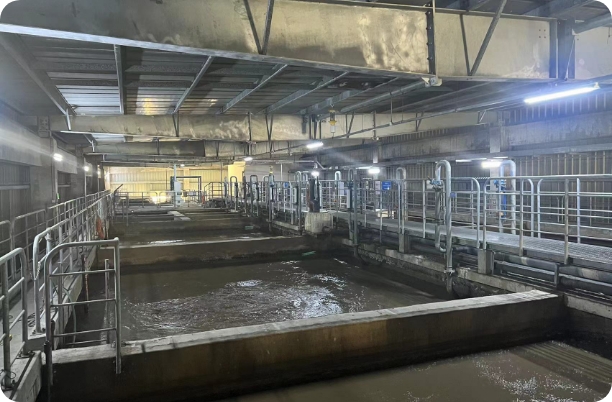
Wastewater treatment facility
Working with local government and other companies to meet the A-level criterion of the central government’s First Class standards for wastewater
The management standards to meet the First Class A-level criterion are very strict. Ten years ago, when construction planning for the Wuxi Plant began, few companies or facilities had high-level water processing technologies. For this reason, we sought out partnerships with the local government of Wuxi’s Xinwu District as well as with companies specializing in water processing. With their cooperation, we were able to design a water treatment facility specifically for Yakult’s use and introduce wastewater treatment systems designed to preserve and improve Lake Tai’s water quality while protecting it from pollution. Today, we successfully meet the following standards:
| Wastewater standards for hazardous substances (unit: mg/L) | ||||
|---|---|---|---|---|
| Item | Standards in area around Wuxi Plant | Source of standard | Average Chinese standard (reference) | Source of standard |
| COD (chemical oxygen demand) |
≦50 | “Discharge standard of pollutants for municipal wastewater treatment plant” (GB/18918-2002) First Class A-level criterion Standards listed in “Wastewater limits for hazardous materials in sewage treatment plants and major industries in cities and towns surrounding Lake Tai” (DB32/T1072-2018) |
≦500 | Third Class criterion listed in “Integrated wastewater discharge standard” (GB8978-1996) |
| SS (suspended solids) |
≦10 | ≦400 | ||
| NH3-N (ammoniacal nitrogen) |
≦4(6) | ≦45 | “Water quality standards for sewage discharged into municipal drainage systems” (GB/T31962-215) A Class criterion | |
| TP (total phosphorous) |
≦0.5 | ≦8 | ||
| TN (total nitrogen) |
≦12(15) | ≦70 | ||
Note: Values outside of parentheses apply where the water temperature is greater than 12°C. Values inside parentheses apply where the water temperature is less than or equal to 12°C.
Wastewater standards in Wuxi concern not only water quality, but also place strict limitations on wastewater volume. When Wuxi Yakult Co., Ltd. was first established in 2014, the district’s environmental protection agency stipulated that only 800 tons of wastewater discharge would be allowed per day. Considering the size of our plant, this was a barely manageable amount. At our production peak in the summer of 2019, production wastewater was reaching 900 tons per day, resulting in days where the amount exceeded the agency’s limits. There were times where we were frequently checking the daily amount of actual water discharge and the capacity of the emergency water tank as we struggled to keep everything within permissible limits. When Wuxi Plant 2 was constructed, we received approval to expand our daily wastewater volume limit to 1,300 tons per day, which was a relief for the whole company.
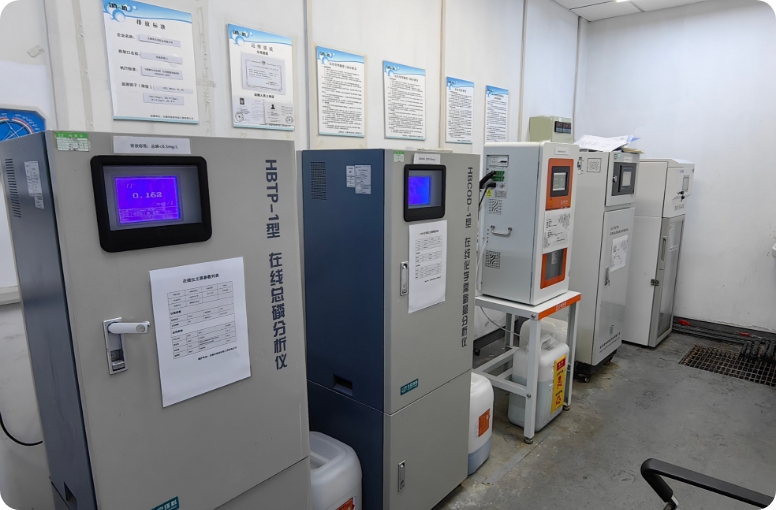
Wastewater analysis machines
Employee Comment

Company: WUXI YAKULT CO., LTD.
Department: Personnel & Admin Section
Name: Ding Suzhen
Employee Comment
As a member of the Yakult Group, I strive to contribute to the creation of healthy, enjoyable lives for the Chinese people. The Group also intends to actively work on renewable energy in order to protect the Earth’s environment.
